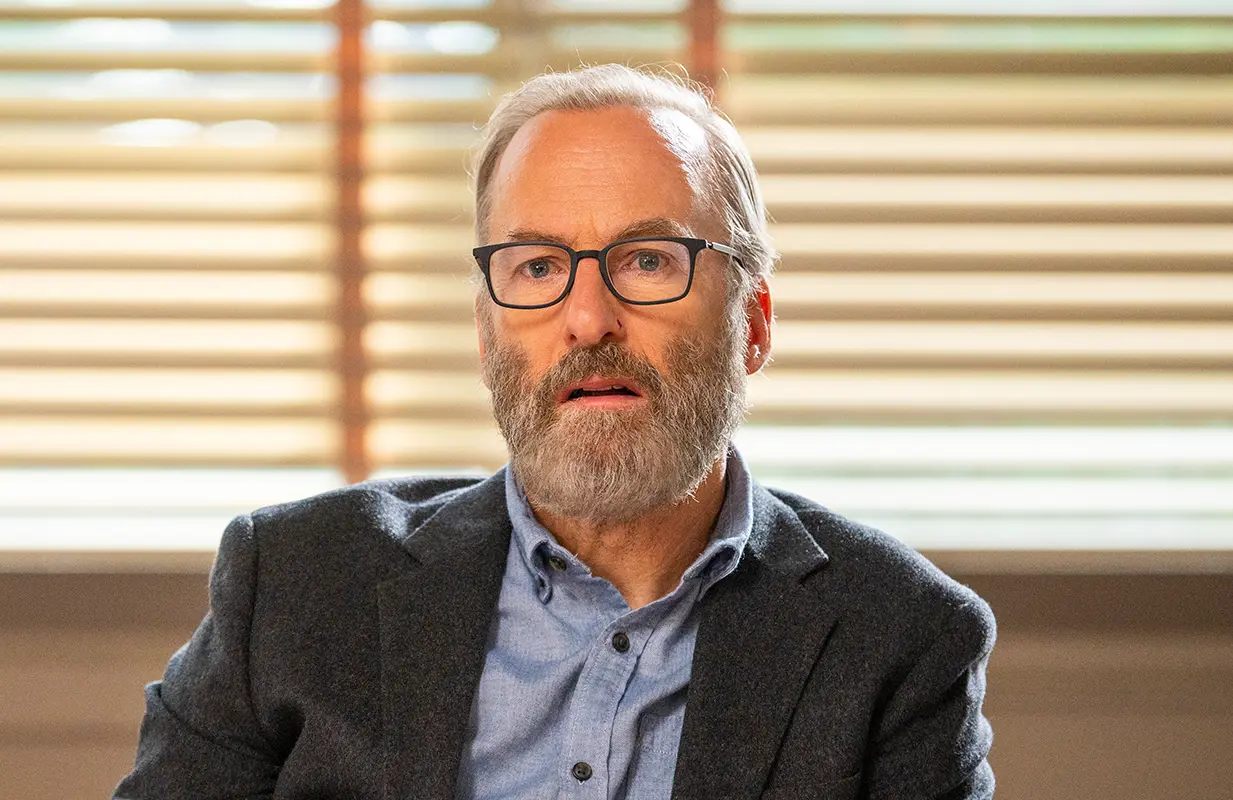Lucky Hank Flounders Early On, But Don't Count Bob Odenkirk Out Just Yet
-
 Bob Odenkirk in Lucky Hank (Photo: Sergei Bachlakov/AMC)
Bob Odenkirk in Lucky Hank (Photo: Sergei Bachlakov/AMC)Bob Odenkirk has been clear that his new AMC comedy Lucky Hank is a far cry from Better Call Saul, and viewers should take him at his word. While the Emmy-nominated Breaking Bad prequel (turned sequel) came out of the gate fully-formed, Lucky Hank struggles to establish a clear identity in its first two episodes, leaving Odenkirk adrift as his character goes through the motions of a midlife crisis.
Based on Richard Russo’s 1997 novel Straight Man — the show’s original title — Lucky Hank stars Odenkirk as William Henry Deveraux, Jr., the dissatisfied chair of the English department at an underfunded university in the Pennsylvania Rust Belt. The son of a prominent literary critic, Hank believes he deserves better than what Railton College has to offer, but at the same time, he’s overcome with doubts that he doesn’t have what it takes to be a truly great fiction writer. This anxiety manifests as complacency: When we meet Hank, who would prefer to stop writing altogether if it meant avoiding potential failure, he’s fallen back on his tenure, and his unshakable belief that he’s above reproach has permeated every aspect of his life.
In the opening minutes of the premiere, Hank unloads on a student, telling him that if he showed more promise, he wouldn’t be here, at “mediocrity’s capital.” Later, when the tirade threatens his role as department chair, he encourages his wife, Lily (Mireille Enos), to apply for a job in New York, only to raise concerns about “logistics” as soon as things start to go Lily’s way. Plenty of protagonists are self-absorbed and emotionally unavailable (just look at the entire Succession crew), but across the first two episodes, these prove to be his only defining characteristics. As a result, Odenkirk, who imbued Saul Goodman with so many shades of gray, faces an uphill battle as he attempts to draw viewers into this character and his story.
It doesn’t help that co-creators Aaron Zelman (Silicon Valley) and Paul Lieberstein (The Office) present Lucky Hank as a first-person account of Hank’s existential crisis. Each episode is dotted with stream-of-consciousness narration from Hank, who sounds off on everything from finding contentment in one’s life — “We’ve become a bit obsessed with happiness. What happened to just getting through the day?” — to penis drawings. But there’s little consistency applied to these asides. Sometimes, as with his reflection on happiness, they bring about a brief moment of honesty for a character who only feels comfortable unburdening himself in dribs and drabs (and only in private). Others, like the lengthy penis monologue — “Forget face recognition. Unlock your phone with your d*ck!” — are played for laughs, as if to illustrate just how easily Hank’s mind wanders from the task at hand. The mix of deep ruminations and infantile comedy is jarring, and it suggests Lucky Hank doesn’t know where it’s going, or what tone best suits that aim.
This sense of fumbling only becomes more apparent as the comedy shifts away from Hank’s emotional turmoil. Episode 2, “George Saunders,” spends a great deal of time with Hank’s colleagues in the English department, particularly poet-in-residence Gracie DuBois (Suzanne Cryer) and literature professor Paul Rourke (Cedric Yarbrough). Paul is openly dismissive of Gracie, and goes so far as to criticize her work in one of his classes, but rather than present this as the clear HR violation it is, Lucky Hank leans into the comedy of their squabble — until suddenly, it goes the opposite direction, when Gracie realizes she’s mistaken her father’s manipulation for love. The moment is completely out of left field, and because there’s no connection to the Paul conflict from earlier, it reads as a bald attempt to tease out unearned emotion from a thinly-drawn backstory.
As other parts of the show flounder, Enos’ Lily emerges as a stabilizing force. The premiere provides a glimpse into Lily’s life not just as Hank’s supportive partner, but as the vice principal at the local high school. Whereas Hank swirls around like a hurricane, leaving destruction in his wake, Lily is a peacemaker, believing it’s better to find “common ground” between frustrated teachers and the parents of misbehaving students than to take punitive action. Enos turns in a commanding performance, but sadly, the second episode shifts away from this storyline and relegates her to a role as Hank’s cheerleader. AMC’s description of the series suggests that Lucky Hank will return to Lily’s own career doubts, but it would have been nice to see her story maintained throughout these early installments.
While Lucky Hank certainly holds promise — never count out Odenkirk — its opening episodes are too scattered to offer anything insightful about midlife crises or academia. This may change as the season progresses, but Hank will need to evolve, and Zelman and Lieberstein must settle on a tone, in order for the comedy to succeed.
Lucky Hank premieres Sunday, March 19 at 9:00 PM ET on AMC and AMC+. Join the discussion about the show in our forums.
Claire Spellberg Lustig is the Senior Editor at Primetimer and a scholar of The View. Follow her on Twitter at @c_spellberg.
TOPICS: Lucky Hank, Aaron Zelman, Bob Odenkirk, Cedric Yarbrough, Mireille Enos, Paul Lieberstein , Suzanne Cryer